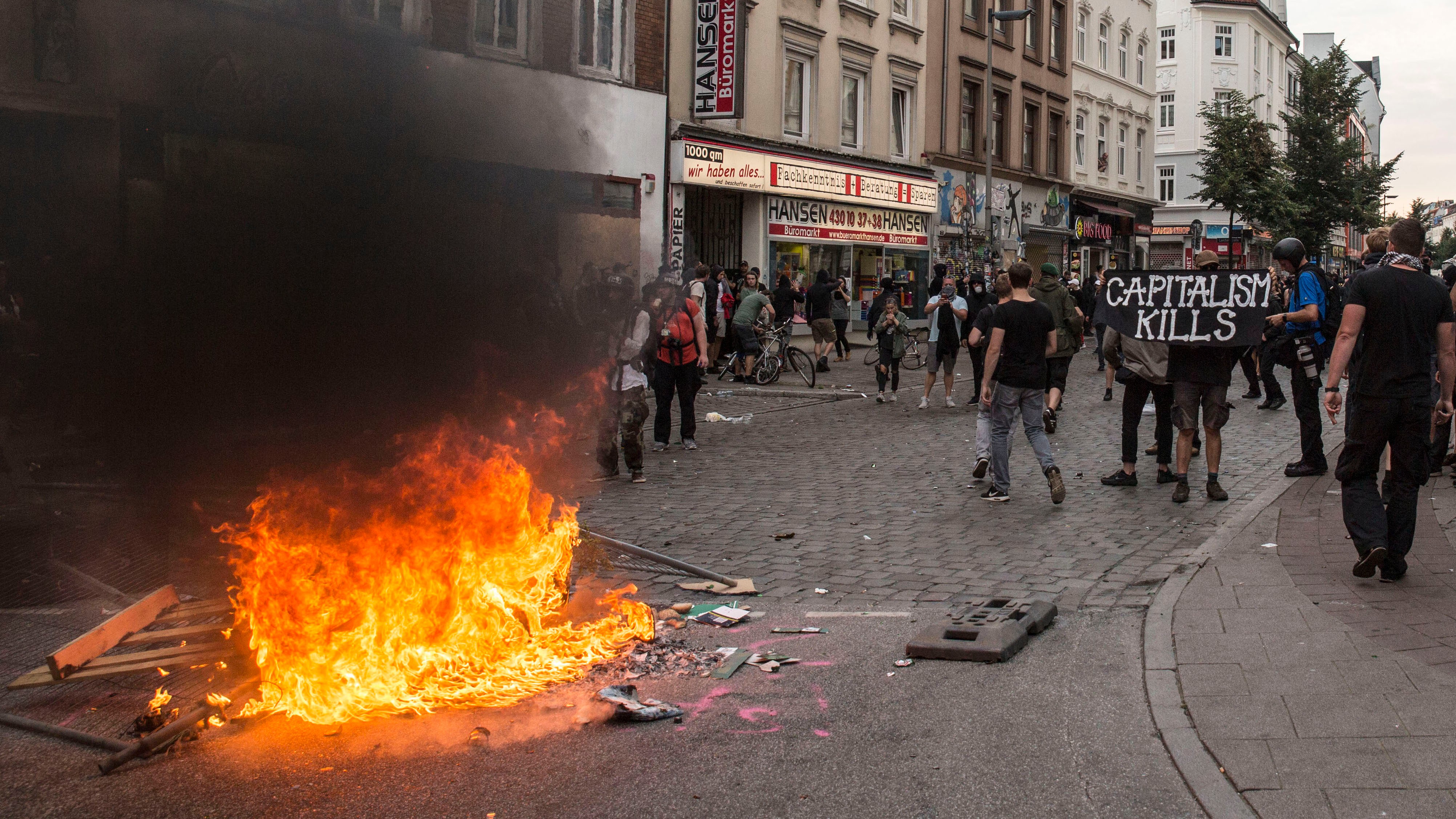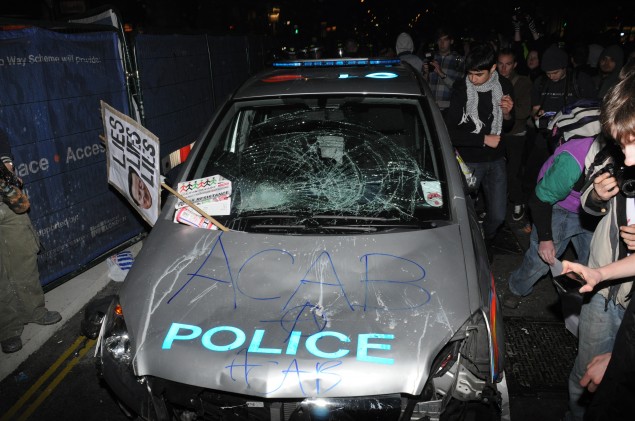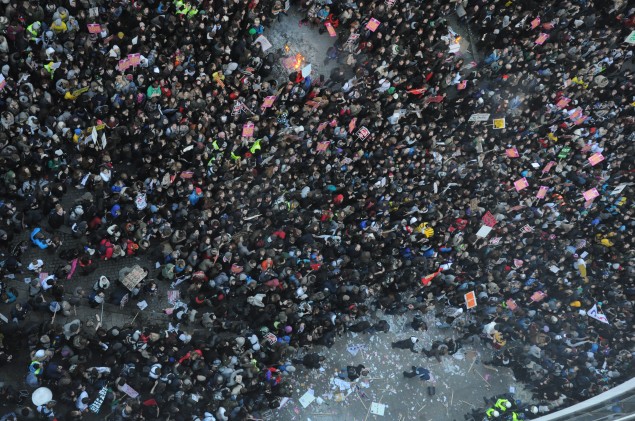Anti-capitalist protesters in Hamburg earlier this year (Photo by Henry Langston)
In 2002 most major protests were against war. The occupation of Afghanistan by the United States and its allies, including the UK, started in 2001 and many of the same powers were about to invade Saddam Hussein's Iraq. My involvement in activism started the year before, attending anti-fascist protests and protests against the war in Afghanistan. It was the anti-globalisation movement which drew me towards activism. Watching news bulletins of thousands of crusties and anarchists smash up the City of London as part of the Carnival Against Capital several years earlier had made me research globalisation and realise quite how fucked up the world was.Back in the 2000s, we'd spend our time hanging out in squats we hoped would become social centres, along the lines of the Italian occupied spaces in Italy which acted as hubs for the anti-globalisation movement over there. That didn’t really work out, and a recently released police document from 2011 could explain why, describing most anarchists as, “little more than disparate groups of squatters living a life on the fringes of mainstream society, moving from squat to squat and often engaging in drug taking and heavy drinking.”The two biggest protests in the UK in 2002 were against war and against the ban on fox hunting. Both saw around 400,000 people march through London, and I’m one of the few people who attended both. On the anti-war march I was part of the “No War But Class War” bloc, which saw several hundred anarchists gather behind a large plastic banner some mates had nicked from a supermarket and spray painted with the slogan. For the march in favour of fox hunting, I joined the small number of hunt saboteurs who were holding a counter-protest against the tweed-clad fox murderers.The anti-war movement was dominated by the Socialist Workers’ Party (SWP). Senior members spoke at nearly every rally. The mass protests against the war (which achieved not a lot in practical terms) were little more than opportunities for the party to sell its newspaper, dupe attendees into signing petitions and try to recruit more members. The days of the SWP being able to dominate a social movement are now over, and that’s one of the most significant changes to activism over the last 15 years. In 2010 the party was accused of covering up rapes and sexual assaults by a leading member. Since then the SWP has splintered and they’re shunned by even greater numbers of left wingers.
Watch:
That collapse of the SWP isn’t all that’s changed. By 2002 the anti-globalisation movement was starting to draw to a close. For several years, every major summit held by global and supranational institutions such as the IMF, World Bank, WTO, Nato and the EU had been targeted with protests by that movement. Tens and occasionally hundreds of thousands of people take to the streets. Broad coalitions of protesters ranging from NGOs to black bloc anarchists would take part. In many places black blocs went on the rampage, smashing up buildings belonging to multinational corporations like McDonalds or Starbucks.Those days are largely over, especially in the UK, where very few anarchists bothered travelling over to Hamburg to take part in the riots during the G8 in June. “Summit hopping” isn't as high up on the anarchist agenda as it once was. Environmental activism has also declined, even though the world is still being literally destroyed for profit. The Climate Camps which took place for a few years at the end of the 00s didn’t make it into the next decade, partly because fighting austerity became the main focus of most activism. That said, campaigns against fracking have given environmentalist activism a bit of a resurgence.Women and ethnic minorities have been at the forefront of activism in the UK since long before I was born, but their contributions have often been ignored or erased. That's started to change as a result of the emergence of intersectional feminism, a form of feminism which recognises there are multiple forms of oppression which intersect. While this tendency has been derided by the alt-right mocking social justice warriors (SJWs) and “snowflakes”, it has changed the face of activism for the better. I can remember women who were involved in the anti-globalistion movement seeming to disappear, subsequently to find out they had been sexually assaulted or harassed by men in the movement. Now, it’s the men who don't respect women who are more likely to be encouraged to disappear.
Environmental activism has also declined, even though the world is still being literally destroyed for profit. The Climate Camps which took place for a few years at the end of the 00s didn’t make it into the next decade, partly because fighting austerity became the main focus of most activism. That said, campaigns against fracking have given environmentalist activism a bit of a resurgence.Women and ethnic minorities have been at the forefront of activism in the UK since long before I was born, but their contributions have often been ignored or erased. That's started to change as a result of the emergence of intersectional feminism, a form of feminism which recognises there are multiple forms of oppression which intersect. While this tendency has been derided by the alt-right mocking social justice warriors (SJWs) and “snowflakes”, it has changed the face of activism for the better. I can remember women who were involved in the anti-globalistion movement seeming to disappear, subsequently to find out they had been sexually assaulted or harassed by men in the movement. Now, it’s the men who don't respect women who are more likely to be encouraged to disappear. When thousands of students stormed the Tory Party’s headquarters at Millbank in 2010 it was the spark for a wave of protest and action which was to dominate activism in the UK for the subsequent years. The student protests and the battle against austerity marked a significant shift taking place in activism. Protests are now more likely to be about things which impact us in our everyday lives, like housing, police brutality, low wages or poor working conditions, than against abstract concepts like capitalism and globalisation. The idea we can create a better world by flying across Europe to take part in large and violent protests outside the gatherings of the rich and powerful seem to have died a death, which is probably for the best.But there is still a lot which could be learned from the anti-globalisation movement. A great deal of effort would be made to organise and promote protests. Anti-globalisation activists were early adopters of the internet. Nowadays, people tend to hype protests by starting a Facebook event and then tweet about it repeatedly to their same 250 followers. Back in the 00s full websites were created with information on why the protests were happening, where people could stay, tips on protesting – pretty much everything which needed covering. Stickers and posters would be put up all over city centres driving people to the websites. It was a lot of hard work but the results were a lot more effective.Back when I was protesting against the wars that Blair started, the Labour Party were seen as the enemy. In part because Jeremy Corbyn was on those protests, a lot of activists today have jumped on Labour’s electoral bandwagon. This could go two ways. If it leads to a new generation of activists learning about what actually matters to people – knocking on door-steps rather than squatting outside a summit – then it might not be a disaster. Alternatively, it might see the Labour Party suck in a load of hopeful activists dreaming of a better world and turn them into the dead-eyed Blairites of the future.@jdpoulter
When thousands of students stormed the Tory Party’s headquarters at Millbank in 2010 it was the spark for a wave of protest and action which was to dominate activism in the UK for the subsequent years. The student protests and the battle against austerity marked a significant shift taking place in activism. Protests are now more likely to be about things which impact us in our everyday lives, like housing, police brutality, low wages or poor working conditions, than against abstract concepts like capitalism and globalisation. The idea we can create a better world by flying across Europe to take part in large and violent protests outside the gatherings of the rich and powerful seem to have died a death, which is probably for the best.But there is still a lot which could be learned from the anti-globalisation movement. A great deal of effort would be made to organise and promote protests. Anti-globalisation activists were early adopters of the internet. Nowadays, people tend to hype protests by starting a Facebook event and then tweet about it repeatedly to their same 250 followers. Back in the 00s full websites were created with information on why the protests were happening, where people could stay, tips on protesting – pretty much everything which needed covering. Stickers and posters would be put up all over city centres driving people to the websites. It was a lot of hard work but the results were a lot more effective.Back when I was protesting against the wars that Blair started, the Labour Party were seen as the enemy. In part because Jeremy Corbyn was on those protests, a lot of activists today have jumped on Labour’s electoral bandwagon. This could go two ways. If it leads to a new generation of activists learning about what actually matters to people – knocking on door-steps rather than squatting outside a summit – then it might not be a disaster. Alternatively, it might see the Labour Party suck in a load of hopeful activists dreaming of a better world and turn them into the dead-eyed Blairites of the future.@jdpoulter
Advertisement
Advertisement
Watch:

That collapse of the SWP isn’t all that’s changed. By 2002 the anti-globalisation movement was starting to draw to a close. For several years, every major summit held by global and supranational institutions such as the IMF, World Bank, WTO, Nato and the EU had been targeted with protests by that movement. Tens and occasionally hundreds of thousands of people take to the streets. Broad coalitions of protesters ranging from NGOs to black bloc anarchists would take part. In many places black blocs went on the rampage, smashing up buildings belonging to multinational corporations like McDonalds or Starbucks.Those days are largely over, especially in the UK, where very few anarchists bothered travelling over to Hamburg to take part in the riots during the G8 in June. “Summit hopping” isn't as high up on the anarchist agenda as it once was.

Advertisement
